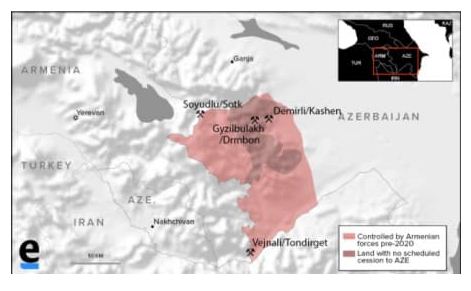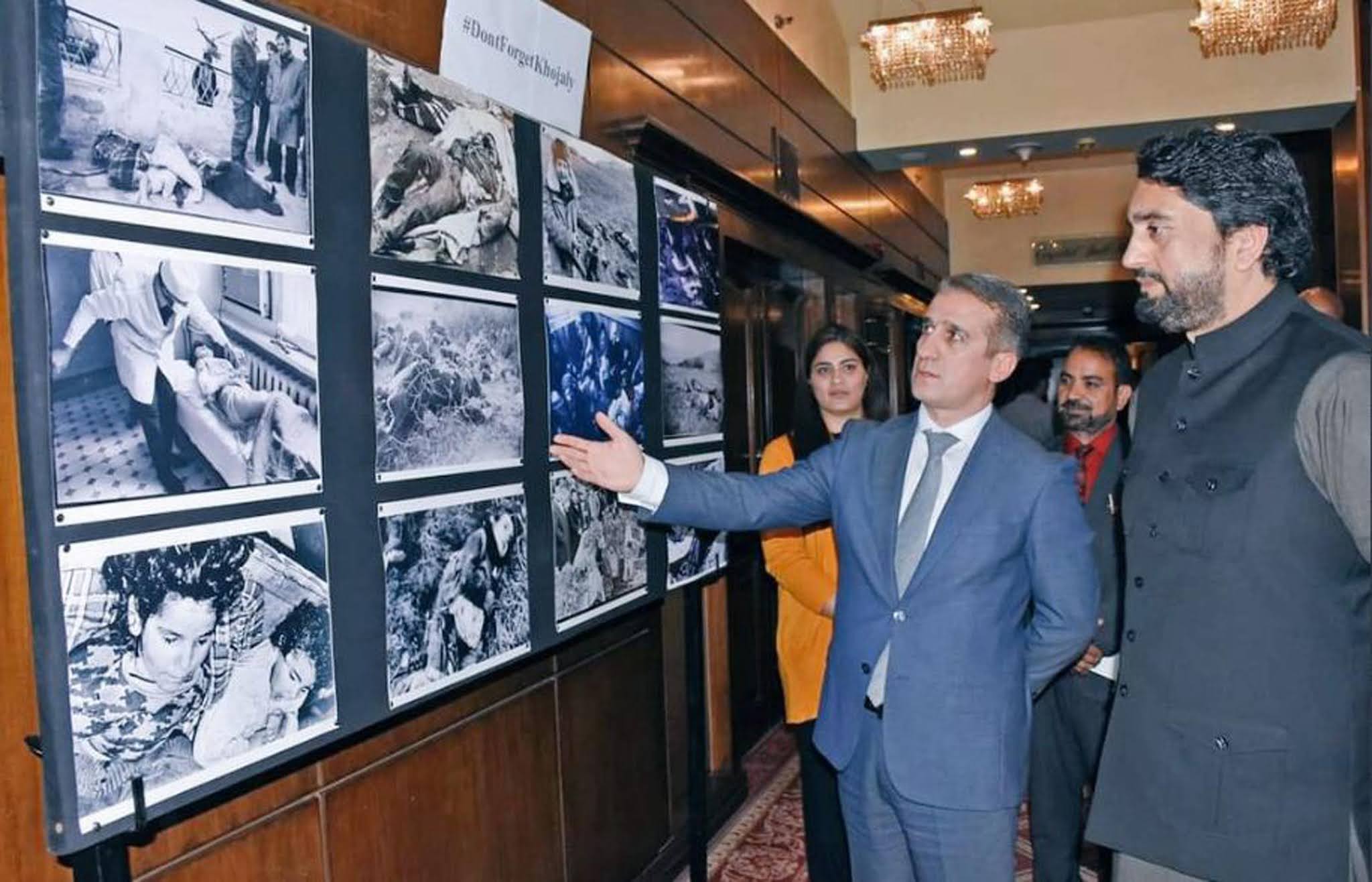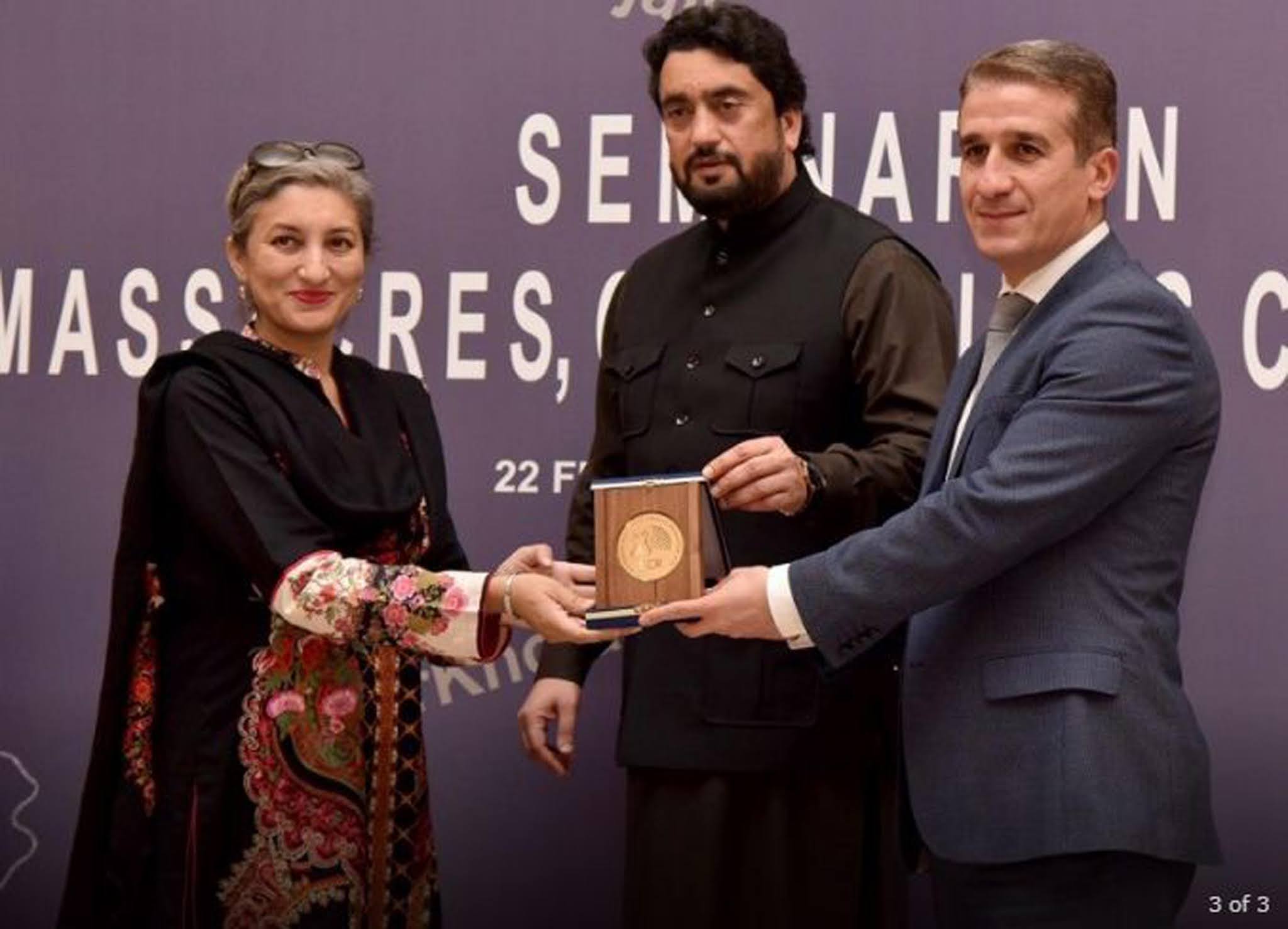BAKU, JAN 2021: Anglo-Asian Mining had been waiting for decades. Since 1997,
the company has held the rights, granted by Azerbaijan, to three gold deposits
beyond its reach, in territories controlled by Armenians. In an October 27
press release it announced that it was looking forward to tapping its
300-square-kilometer Vejnali contract area, which had just been retaken by
Azerbaijani troops: “Once secure, the company plans to immediately start work.”
After the fighting ended, some two weeks later, Armenian troops handed back
more gold-mining areas, including the Kelbajar region, home to one of the most
productive gold mines in the Caucasus.
Nagorno-Karabakh and the areas around it are rich in
deposits of gold, copper, and other valuable metals. For decades, mining
revenues helped prop up the de facto Nagorno-Karabakh Republic. In 2019, for
example, 13 percent of Nagorno-Karabakh’s GDP came from the extractive
industry, according to the territory’s statistics service, making it the top
source of tax revenues. During the war Nagorno-Karabakh – which Armenians call
Artsakh – lost control not only of profitable mines but, according to the de
facto economy minister, “most of the hydroelectric plants.”
"Taking into account the obstacles caused by land
losses as a result of hostilities, the Artsakh government will not be able to
provide the revenue to fund its budget not only this year, but also in the coming
years. According to my calculations, tax collection in Artsakh will be reduced
by 40 billion drams [$80 million], or 65 percent,” Yerevan-based economist
Suren Parsyan, who is connected to Armenia’s opposition, told Eurasianet.
The 44-day war that ended on November 9 radically changed
the map of the South Caucasus – and with it, the economic foundations of
Nagorno-Karabakh and Armenia. Now, after pushing for years to attract
international attention to what it describes as the looting of its territories,
Baku’s timing is auspicious: Around the world, investors are piling into
precious metals as a hedge against inflation, which is expected to rise
globally with coronavirus stimulus policies. The price of gold has jumped about
19 percent in the last 12 months. Copper futures hit multi-year highs this
month.
The precise economic stakes for both Armenia and Azerbaijan
are obscured by opaque governments. Mining enterprises in Armenia are obliged
to disclose little information; activists’ repeated efforts to introduce
transparency requirements have failed. We are only able to deduce the scale of
miners’ contributions to Yerevan’s and Stepanakert’s coffers because both do
release figures on large tax payments. Azerbaijan’s gold industry, for its
part, has been tarnished by investigative reports showing how, in other mining
ventures, President Ilham Aliyev’s daughters Arzu and Leyla Aliyeva extracted
millions of dollars in profits, stashed them offshore, and then left rural
mining communities, in the words of the Organized Crime and Corruption
Reporting Project, “high and dry.”
Worth its weight
During Armenia and Azerbaijan’s first war over
Nagorno-Karabakh as the Soviet Union collapsed in the early 1990s, Armenian
troops took control of the territory and seven adjoining districts – all
internationally recognized as belonging to Azerbaijan. The war ended, after
tens of thousands of deaths, in a 1994 ceasefire that largely held until late
2020. Nagorno-Karabakh had declared itself independent and become an unrecognized
satellite of impoverished Armenia.
Only three years after the ceasefire, a Delaware-registered
company, R.V. Investment Group Services, signed an agreement with Baku for
exclusive rights to six mines, three of them on territories under Armenia’s de
facto control.
The man who signed that agreement is Reza Vaziri, a former
official in Iran’s pre-revolutionary government and today the president, CEO,
and largest known shareholder in Anglo-Asian Mining, which operates exclusively
in Azerbaijan.
The company did not respond to requests for comment.
Anglo-Asian Mining has enjoyed a sharp uptick in the price
of gold since the 2008 financial crisis. In a preliminary 2020 report released
on January 14, Vaziri said the company enjoyed “record revenues … in excess of
$100 million” last year from its operations in two mines to the north of
Nagorno-Karabakh – Gosha and Gedabek.
With licenses “restored” by the most recent war, Anglo-Asian
Mining expects “to deliver substantial shareholder value over the coming
years,” Vaziri said, adding, “we will start evaluating additional development
of our licenses in the restored Vejnali, Soutely and Gyzilbulakh contract areas
as soon as practically possible.”
The mines to which Anglo-Asian Mining holds rights:

Soyudlu/Sotk
Until work was suspended in November, the open-pit Soyudlu
gold mine (also known as Soutely, Zod, or, in Armenian, Sotk) on the border
between Azerbaijan’s Kelbajar district and Armenia was exceptionally
productive. It was being operated by GPM Gold, the fourth-largest taxpayer in
Armenia in 2020 according to the State Revenue Committee, when it paid over 30
billion drams ($58 million) into government coffers. As of October, the mine,
which also produces silver, employed 1,654 people.
GPM Gold is wholly owned by Cyprus-registered GeoProMining
Investment, which is managed through a web of offshore outfits. Last summer
Russian real estate and airport tycoon Roman Trotsenko became the controlling
shareholder of GeoProMining. Trotsenko is a former advisor to Igor Sechin, the
CEO of Russia’s biggest oil company, Rosneft, and a close ally to Vladimir
Putin.
Sotk grossed $126 million in 2019, by far GeoProMining’s
largest operation. The company’s website says the mine yielded 130,000 ounces
of gold in 2018 and has an operating life of another 18 years. Yet its
bondholders cannot be pleased: In its audited 2019 financial report, the
company did not list Azerbaijan as a political risk; in fact, the document did
not mention Azerbaijan at all. (Neither, for that matter, did the big ratings
agencies.)
Inside Armenia, GeoProMining also operates the Ararat Gold
Recovery Plant, which it upgraded in 2014, and a copper-molybdenum plant in the
south. In Russia, it operates several fields in Siberia.
If any of these mines offers Armenia and Azerbaijan an
opportunity for mutual benefit, it is Soyudlu/Sotk. But that would require
cooperation. Armenian officials have said that half the mine is on Armenian
territory, while an Azerbaijani official has said that 74 percent lies on Azerbaijani
territory. When Azerbaijani troops took back control of Kelbajar as part of the
November peace deal, the local village head said they forced Armenian workers
to leave – a claim Yerevan denied. Azerbaijan’s Defense Ministry released this
video of the site after it had been deserted.
Vejnali/Tondirget
Discovered in the late 1950s and confirmed to hold up to 6.5
tons of gold, in recent years Vejnali has been mined by a company called Gold
Star, which was the fourth-largest taxpayer in Nagorno-Karabakh in 2019
according to the State Revenue Committee. Little is known about the company,
though a 2020 financial report seen by Eurasianet shows a 1 billion dram ($2
million) loss. Gold Star is run by a Swiss-Armenian citizen, Vartan Sirmakes,
who is Armenia’s consul in Marseille, France, and co-founder of luxury watch
brand Franck Muller. Baku has sought Swiss help prosecuting Sirmakes for his
role in operating the mine.
Armenian environmentalists have complained of a lack of
oversight at the mine.
Gyzilbulakh/Drmbon and Demirli/Kashen
Until the 2020 war, these two mines were operated by
Karabakh’s largest taxpayer, Base Metals, which paid 18.7 billion drams ($38.5
million) to the treasury in 2019; by the company’s calculations, it alone was
responsible for 32 percent of Karabakh’s revenues. Parsyan, the economist,
estimates that the firm accounted for 60 percent of exports.
Base Metals is owned by Vallex Group, which has holdings in
metals, IT, and tourism in both Armenia and Nagorno-Karabakh – it even helped
sponsor a key highway between Armenia and Armenian-held territories that opened
in 2017. Armenia lost control of the highway during the recent war.
Vallex confirmed to Eurasianet that operations at both mines
– which are 15 kilometers apart as the crow flies – have been on hold since the
war. The company was unable to answer questions by the time of publication, but
a source close to the Karabakh authorities told Eurasianet that both mines
remain under Armenian control, though Azerbaijani troops had taken a crucial
pumping station, without which neither mine cannot operate. Karabakh’s de facto
minister of territorial administration and development, Zhirayr Mirzoyan, has
told Armenian investigative news site Hetq that building a new pumping station
would be time-consuming and expensive.
Gyzilbulakh (Drmbon in Armenian) is an underground copper
and gold mine founded in the early 2000s. Almost a decade ago, it was
reportedly nearing the end of its working life.
Azerbaijani prosecutors have accused Vallex and Base Metals
of "almost complete depletion" of Gyzilbulakh, earning some 302
million manats ($178 million today) in "illegal profits" between 2009
and 2017. A 2019 report from Azerbaijan’s MFA and based on high-resolution
satellite imagery included concerns about the tailings pond where chemical
waste is stored at Gyzilbulakh.
In a January 21 statement, Anglo-Asian Mining claimed the
site had been restored to Azerbaijani control and that, because it sits within
Nagorno-Karabakh, it is protected by Russian peacekeepers. Access, the company
said, “will depend on the final resolution of the status of Nagorno-Karabakh.”
Yet more of a prize today is the nearby Demirli (Kashen in
Armenian) open-pit copper and molybdenum mine near Aghdara (Martakert), said to
hold 100 million tons of copper. Vallex claimed in July 2020 that it had
invested $250 million in the site, which employed almost 1,500 people.
Azerbaijan’s prosecutor has charged Vallex’s president,
Russian-Armenian Valeri Mejlumyan (no relation to one of the authors), with
illegal extraction and belonging to an organized criminal group.
This is not Vallex’s first setback. In 2018, the company had
its Teghut copper and molybdenum mine in northern Armenia seized by its Russian
creditor, VTB Bank, after being unable to service a $380 million loan during a
shutdown linked to concerns about the environmental impact of tailings dumps.
All that glitters
Anglo-Asian Mining’s strong balance sheet suggests it will
have fewer troubles than Vallex. It also shows how the Aliyev family casts a
long shadow over any lucrative industry in Azerbaijan.
The same year the first daughters were leaving hundreds of
Azerbaijani miners high and dry, Anglo-Asian Mining received a $3 million
credit line from Baku-based Pasha Bank. The bank lists the Aliyeva sisters and
their maternal grandfather as its ultimate beneficial owners.
Anglo-Asian Mining – which is now debt-free – is also well-connected
in the United States.
After Vaziri, the company’s second-largest shareholder is
former Governor John Sununu of New Hampshire, who served as President George H.
W. Bush's chief of staff and owns 9.4 percent of the company, a stake worth
about $25 million. Sununu’s son Michael is also on the board. Another son,
Chris, is currently a first-term governor of New Hampshire.
Meanwhile, the government in Baku is taking its message
abroad. If the Armenian companies "do not pay compensation," Aliyev
said on January 6, Baku will pursue international arbitration. "There is
no place in the modern world for companies and people who illegally exploit
natural resources in another country and make a profit from that. Therefore,
they must calculate the value of the gold and other natural resources they
illegally exploited, calculate the damage they have caused, the income gained,
and compensate us."
With record high prices for commodities, plus hopes for an
economic rebound in 2021 fueled by a COVID vaccine and loose monetary policy,
and excitement about new green technologies built with the kinds of metals
under the soil in Karabakh, Baku must be eager for Anglo-Asian Mining to start
digging. Across the frontier, the losses threaten to leave Armenians out of the
next economic recovery.
-----------------------------------------------------------------
COURTESY oilprice.com
------------










